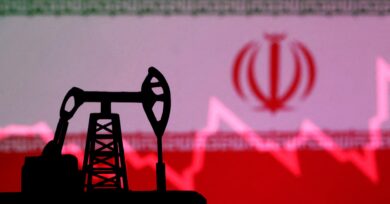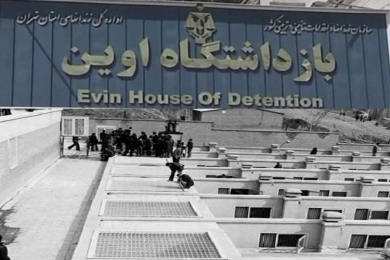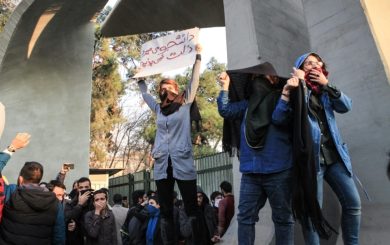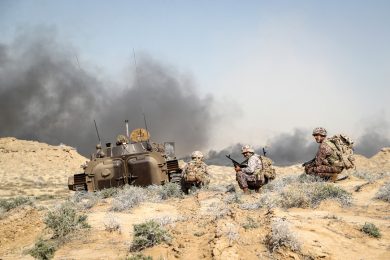The Islamic Revolutionary Guard Corps (IRGC), a branch of Iran’s military founded after the 1979 Islamic Revolution, has evolved into a multi-faceted force with extensive influence over military, economic, and political affairs in Iran and across the Middle East. Beyond its domestic role, the IRGC operates as a key player in regional conflicts, proxy wars, cyber warfare, and terrorism, making it a significant threat to global security. This article offers a comprehensive overview of the ways in which the IRGC endangers international peace, analyzing its proxy networks, military activities, terrorist links, and cyber operations.
1. The IRGC’s Role in Regional Instability
The IRGC, particularly its Quds Force, has fueled conflict and instability throughout the Middle East by supporting and coordinating armed groups and militias.
A. Proxy Wars
The IRGC relies on proxy forces to expand Iran’s influence and counter rival powers, including Saudi Arabia, Israel, and the United States. These groups engage in military operations that destabilize entire regions.
Key Proxy Groups:
1. Hezbollah (Lebanon)
• Receives funding, training, and weapons from the IRGC.
• Conducts military attacks on Israel and supports the Syrian regime.
2. Houthi Rebels (Yemen)
• Supported by the IRGC in their war against the Saudi-led coalition.
• Responsible for missile attacks on Saudi and UAE infrastructure.
3. Shia Militias (Iraq and Syria)
• Integrated into Iraq’s Popular Mobilization Forces (PMF), destabilizing the country’s political system.
• Helped prop up Bashar al-Assad’s regime during the Syrian Civil War.
B. Prolonging Conflicts
By arming and financing these militias, the IRGC prolongs civil wars and sectarian violence, worsening humanitarian crises in countries like Syria, Iraq, and Yemen.
2. Support for Terrorism
The IRGC has been designated a terrorist organization by several countries, including the United States, for its direct support of terrorist activities.
A. Hezbollah’s Global Network
Hezbollah, heavily backed by the IRGC, operates not only in the Middle East but also in Africa, Europe, and Latin America.
• The group has been linked to terrorist attacks, such as the 1994 bombing of the AMIA Jewish center in Argentina.
• Hezbollah’s activities include drug trafficking and money laundering, used to finance terrorism.
B. Assassination Plots
The IRGC has been implicated in assassination attempts targeting Iranian dissidents and foreign officials around the world.
• Recent plots include attempted assassinations in Europe and the United States.
• Iranian intelligence operatives working with the IRGC have been arrested for planning cyber-enabled attacks on critical infrastructure.
3. Cyber Warfare and Espionage
The IRGC has developed a sophisticated cyber warfare program to conduct espionage, sabotage, and propaganda campaigns.
A. Cyber Attacks on Critical Infrastructure
The IRGC has been linked to cyberattacks targeting critical infrastructure in several countries.
• Attacks on Saudi Aramco in 2012, which disrupted operations at the world’s largest oil producer, were attributed to Iranian cyber units.
• Iranian hackers have also targeted U.S. financial institutions and government agencies.
B. Disinformation Campaigns
The IRGC runs cyber units that manipulate social media and spread disinformation to influence elections and public opinion.
• These campaigns aim to discredit protests, spread anti-Western narratives, and divide opposition movements.
• The IRGC often portrays activists and journalists as foreign agents in its propaganda.
4. Threats to Global Energy Security
The IRGC’s activities in the Persian Gulf pose a direct threat to the stability of global energy markets.
A. Disruption of Shipping Routes
The IRGC’s naval units have conducted attacks on oil tankers and harassment of commercial vessels in the Strait of Hormuz, a critical chokepoint for global oil shipments.
• In 2019, the IRGC seized several foreign oil tankers, heightening tensions with the United States and its allies.
B. Targeting Energy Infrastructure
The IRGC and its proxies have launched missile and drone attacks on oil refineries and pipelines in Saudi Arabia, disrupting global oil supplies.
5. Domestic Repression and Human Rights Violations
The IRGC is responsible for enforcing domestic repression, targeting protesters, journalists, and activists through violence, arrests, and intimidation.
A. Crackdowns on Protests
The IRGC plays a key role in crushing pro-democracy protests and women’s rights movements.
• During the 2019 fuel price protests, IRGC forces killed over 1,500 demonstrators and detained thousands more.
• The Women, Life, Freedom protests have faced similar repression, with reports of torture and sexual violence against detainees.
B. Surveillance and Censorship
The IRGC enforces internet shutdowns and monitors social media to suppress dissent.
• Activists are frequently arrested for their online activities, with cyber units tracking encrypted communications.
6. International Responses to the IRGC
Countries around the world have implemented measures to counter the IRGC’s influence, including sanctions, military operations, and diplomatic pressure.
A. Sanctions and Economic Isolation
The United States, European Union, and Canada have imposed targeted sanctions on IRGC leaders and entities involved in terrorism and human rights abuses.
• These measures restrict the IRGC’s access to international financial systems and trade.
• However, sanctions have also raised concerns about their impact on ordinary Iranians.
B. Military Countermeasures
Countries like Israel and Saudi Arabia have launched airstrikes on IRGC-affiliated targets in Syria and Iraq to limit its military influence.
• U.S. forces have also carried out strikes against IRGC-backed militias responsible for attacks on American troops.
7. The Path Forward: Strengthening Global Security
To effectively counter the IRGC’s threats to global security, the international community must adopt a comprehensive strategy that includes:
A. Enhanced Sanctions Enforcement
• Strengthen enforcement of sanctions to disrupt the IRGC’s financial networks and illicit trade.
B. Multilateral Cooperation
• Increase intelligence-sharing and counterterrorism coordination among countries affected by the IRGC’s activities.
C. Support for Civil Society
• Provide support for human rights organizations and independent media to counter IRGC propaganda and promote democratic reform in Iran.
Conclusion
The IRGC poses a significant threat to global security through its involvement in proxy wars, terrorism, cyber warfare, and domestic repression. Addressing these threats requires international solidarity, stronger sanctions, and support for activists fighting for freedom and justice. Only through coordinated action can the world mitigate the IRGC’s destabilizing influence and promote lasting peace.
Join Our Newsletter!
Stay informed with the latest updates, news, and ways to take action in the fight for justice and global security. Sign up now to get updates delivered straight to your inbox!





